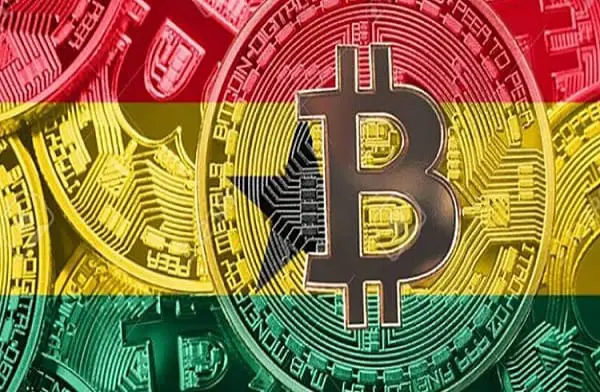By Ghana News
Copyright ghanamma

Ghana stands at a critical juncture in its digital finance evolution as mobile money systems achieve unprecedented success while cryptocurrency adoption creates new regulatory challenges and consumer protection concerns.
Mobile money transactions reached a record GHS 365 billion in April 2025, representing a 3.8% increase from GHS 351.7 billion recorded in March, according to the Bank of Ghana’s (BoG) latest economic and financial data report. The ecosystem now supports 75.2 million registered accounts, demonstrating the platform’s dominance in Ghana’s financial landscape.
The mobile money success story contrasts sharply with growing cryptocurrency adoption among young adults and urban populations seeking alternative wealth preservation methods amid cedi depreciation and persistent inflation. While mobile money provides stability and inclusion, crypto platforms attract users with promises of value hedging and investment opportunities.
Bank of Ghana Governor Dr. Johnson Asiama announced that the central bank will begin regulating cryptocurrency platforms and Virtual Asset Service Providers (VASPs) by the end of September 2025, marking a significant policy shift in Ghana’s financial regulatory landscape.
The regulatory transition follows draft guidelines issued by BoG in August 2024 proposing mandatory registration for VASPs, anti-money laundering compliance obligations, and strict internal control systems. All VASPs operating in Ghana were required to register by August 15, 2025, as preparation for official licensing and regulation.
Mobile money’s inclusion dividend remains substantial, with April 2025 figures showing an 80% increase from GHS 203 billion in April 2024. The platform has successfully reached rural populations using basic phones, establishing itself as essential infrastructure for daily economic activities including bill payments, remittances, and small business transactions.
However, cryptocurrency adoption introduces new dynamics to Ghana’s digital finance ecosystem. Young adults increasingly explore crypto trading and stablecoin usage as hedges against cedi volatility, with some utilizing prediction-style platforms that allow users to speculate on price movements of major cryptocurrencies like Bitcoin and Ethereum.
The appeal of cryptocurrency stems primarily from economic pressures including inflation and currency depreciation. Ghanaians seek alternatives to preserve value and access dollar-denominated assets through stablecoins, while others pursue speculative trading opportunities despite inherent volatility risks.
Consumer protection concerns have intensified as crypto-related fraud becomes more visible. Early 2025 incidents included high-profile social media account hacks used to promote cryptocurrency scams, highlighting how fraudsters exploit trust and public visibility to target victims.
Mobile money platforms face similar fraud challenges including fraudulent text messages, agent collusion, and SIM-swap schemes, though telecommunications companies and financial institutions have strengthened verification and reporting procedures to combat these threats.
The scale and opacity of cryptocurrency fraud differ significantly from mobile money risks. Once cryptocurrency funds leave digital wallets, recovery becomes virtually impossible, emphasizing the need for enhanced oversight, consumer education, and technical safeguards.
BoG’s regulatory announcement came during the African Leaders and Partners Forum 2025 in Washington, D.C., where the Governor indicated plans to enact VASP legislation. The licensing framework aims to track capital flows more effectively, close tax gaps, and support macroeconomic planning.
The regulatory approach reflects Ghana’s attempt to balance innovation with consumer protection. The Financial Action Task Force requires states to impose anti-money laundering and counter-terrorist financing measures on virtual asset service providers, compelling Ghana to align with international compliance standards.
The inclusion versus inequality debate surrounding digital finance intensifies as cryptocurrency adoption grows. While mobile money successfully serves rural populations with basic technology, cryptocurrency requires smartphones, internet connectivity, and technical knowledge, potentially creating new digital divides.
Speculative cryptocurrency usage risks widening existing inequalities, as higher-income users may benefit from successful investments while low-income individuals could lose scarce resources to volatile asset gambling. Without proper regulation and education, financial inclusion promises may transform into increased vulnerability.
Virtual Asset Service Providers operating in Ghana must prioritize anti-money laundering and counter-financing of terrorism measures, even absent specific crypto legislation, according to compliance experts.
The policy challenge involves maintaining mobile money’s expansion benefits while addressing cryptocurrency’s growing presence among Ghanaians. Ignoring crypto adoption would leave consumers exposed to unregulated platforms and potential fraud.
A balanced regulatory approach requires rapid implementation of VASP registration requirements, targeted consumer awareness campaigns about cryptocurrency risks, and ongoing consultations on cybersecurity standards. Ghana’s central bank has demonstrated capacity for swift regulatory action when necessary.
The evidence suggests mobile money continues closing financial inclusion gaps while cryptocurrency’s contribution remains uncertain. The success of digital finance integration depends on regulatory development, consumer education effectiveness, and enforcement capabilities.
Ghana’s digital finance evolution represents a test case for balancing innovation with stability. Mobile money’s proven track record provides a foundation for inclusive financial services, while cryptocurrency regulation will determine whether digital assets complement or undermine existing progress.
The September 2025 regulatory timeline provides opportunity for comprehensive framework development that protects consumers while allowing legitimate cryptocurrency innovation. Success requires coordinated efforts between regulators, service providers, and consumer education initiatives.



